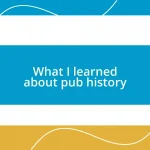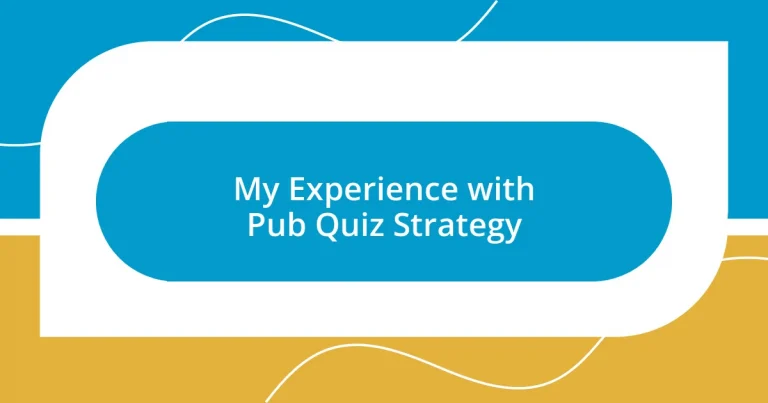Key takeaways:
- Successful pub quizzing relies on a balanced, knowledgeable team, effective time management, and adaptability to different quiz formats.
- Collaborative strategies such as open communication, defined roles, and engaging with the quizmaster contribute to improved performance and team bonding.
- Post-quiz reflection enhances learning and strengthens team relationships, turning challenges into opportunities for growth and connection.
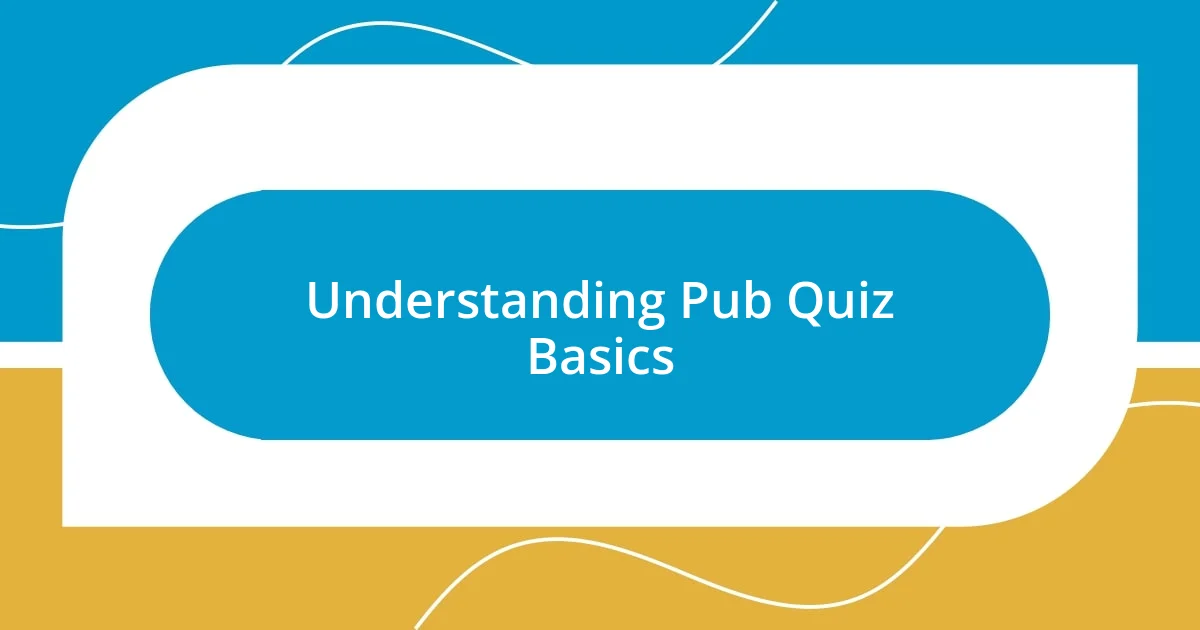
Understanding Pub Quiz Basics
A pub quiz isn’t just about the questions; it’s the whole experience that makes it memorable. I recall one night when my team and I were stuck on a particularly tricky question about 80s pop music. We spent ages debating the answer, and I felt a mix of frustration and excitement – it’s that rush that keeps bringing me back to quiz night!
The format of a typical pub quiz usually includes multiple rounds, spanning various topics like history, geography, and pop culture. It’s fascinating how these rounds can reveal hidden knowledge within your friends. Have you ever found yourself surprised by who excels in certain categories? I still chuckle at how one of my teammates, usually quiet and reserved, shocked us all with his vast knowledge of sports trivia.
Timing is crucial in pub quizzes. The pressure to secure those last few points can really heighten your adrenaline, and I thrive on that feeling. I remember glancing at the clock, heart racing, as we scrambled to write down our final answers. That moment taught me that staying calm under pressure and working as a cohesive team can make all the difference!
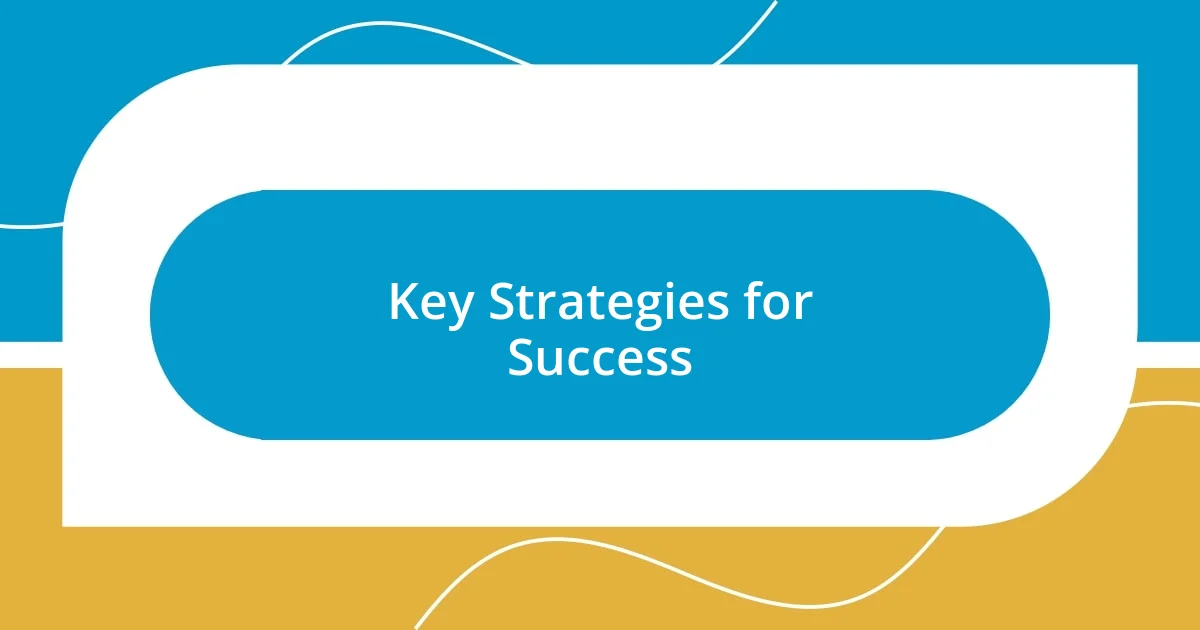
Key Strategies for Success
To succeed at pub quizzes, I’ve learned that having a balanced team with diverse knowledge is essential. During one memorable quiz, my friend who has an uncanny ability to remember random facts saved us from a disastrous round on classic literature. His insights often fill in the gaps that my own knowledge might miss.
Here are some key strategies that can significantly improve your quiz performance:
- Diverse Knowledge Base: Assemble a team with varied interests and expertise; this creates a safety net for tricky questions.
- Stay Calm Under Pressure: I found that panicking leads to mistakes. Take a deep breath and focus on the questions at hand.
- Practice Makes Perfect: Regularly participating in quizzes can sharpen your recall abilities. The more you play, the better you’ll get!
- Use Your Lifelines Wisely: If the quiz allows it, don’t hesitate to consult with each other. Discussing answers often leads to the correct choice.
- Engage with the Quizmaster: Building rapport with the quizmaster can lead to more insight about the questions and themes you might encounter.
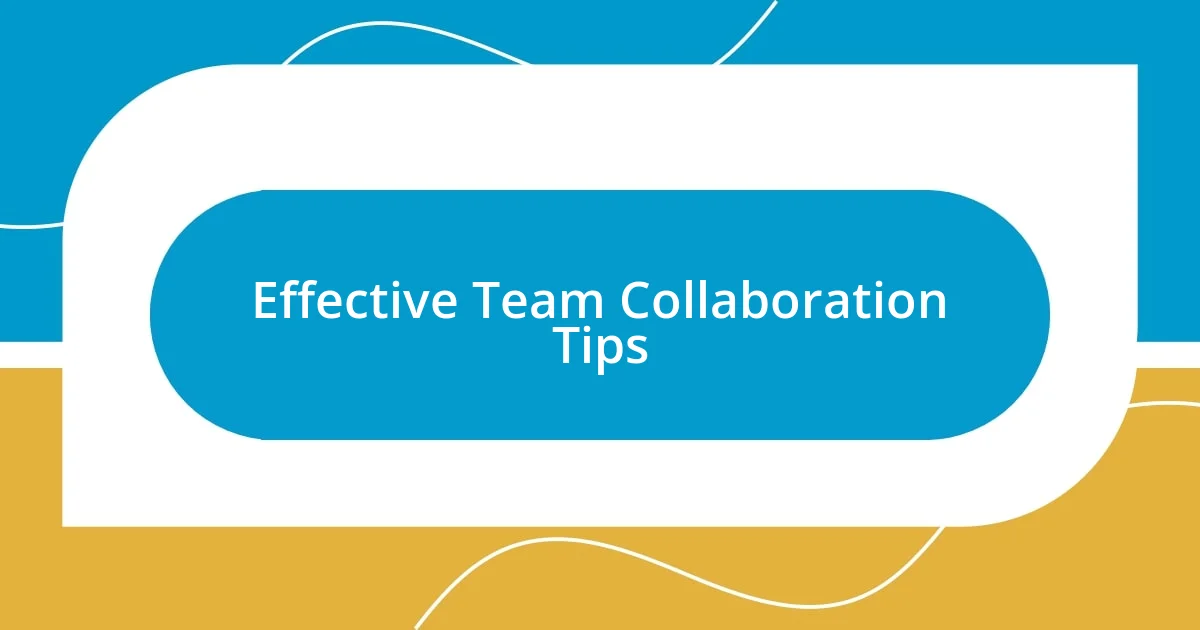
Effective Team Collaboration Tips
Effective collaboration in a pub quiz team can truly enhance the experience and the outcome. I remember a particular night when we faced a tough science category. Instead of getting flustered, we decided to break down the questions together. It felt like a united front—everyone contributed their thoughts, and it ultimately led us to the correct answers. This shared approach not only improved our score but strengthened our bond as teammates.
Listening to each other is also vital. I’ve seen teams falter simply because members were too eager to voice their opinions without considering others. During one quiz, a teammate quietly suggested an answer that seemed out of left field, but we decided to trust her instincts. It turned out she was right! This experience taught me the importance of fostering an open environment where every voice counts.
Lastly, establishing clear roles within the team can streamline collaboration. In my experience, assigning specific categories to team members—like assigning one person to handle history questions while another tackles pop culture—creates a sense of accountability. This approach also allows each member to prepare ahead of time. I recall a quiz where I dedicated my evening to brushing up on geography, which paid off when we faced a particularly challenging map question.
| Collaboration Tip | Description |
|---|---|
| Open Communication | Encourage everyone to share their ideas and answers, fostering a supportive atmosphere. |
| Defined Roles | Assign categories to team members to enhance accountability and preparation. |
| Celebrate Contributions | Acknowledge everyone’s input regardless of the outcome to boost morale and teamwork. |
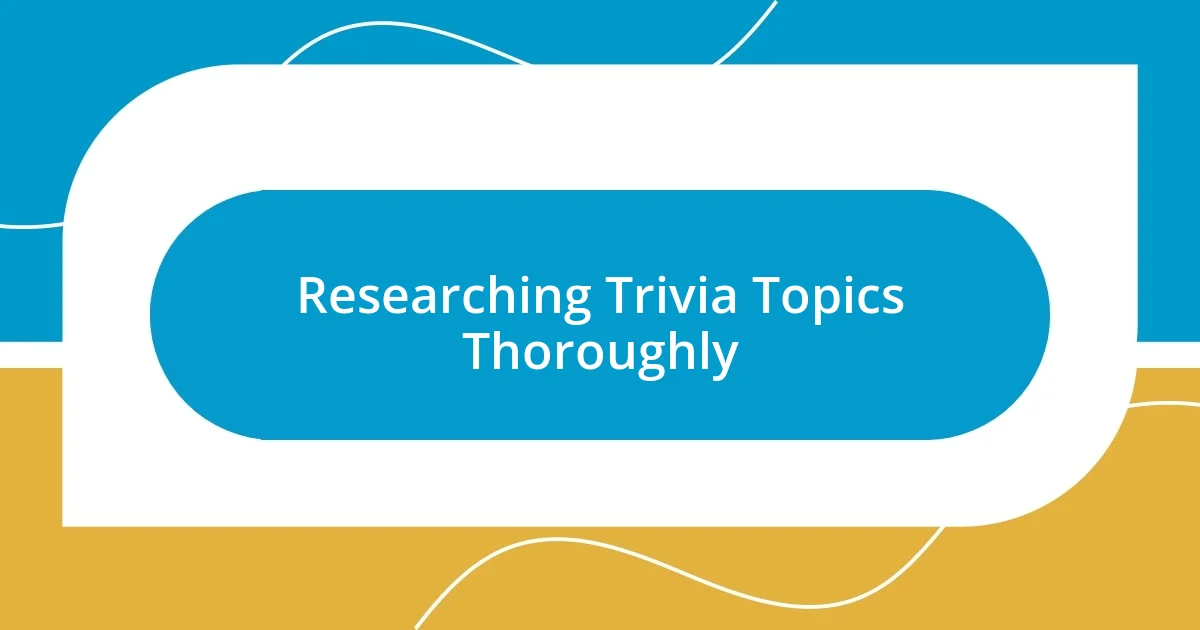
Researching Trivia Topics Thoroughly
Researching trivia topics thoroughly is a game changer for any pub quiz enthusiast. I still remember the thrill of discovering obscure facts about 90s music one weekend; it felt like finding a hidden gem. This preparation not only boosts your confidence but also broadens your knowledge scope. Have you ever noticed how a little trivia knowledge can spark a lively discussion? That’s exactly why doing some light research before quiz night can set your team apart.
One strategy I’ve found particularly effective is using online trivia sources to prepare. Websites, apps, and even social media can be goldmines for current trends and random facts. For example, I often dive into Wikipedia rabbit holes or trivia podcasts, which can be a fun way to learn interesting tidbits. Just last month, I brushed up on world capitals using flashcards, which unexpectedly came in clutch during a geography round. It made me realize how beneficial these small efforts can be when it’s time to shine.
Don’t overlook the power of keeping up with popular culture, either. I’ve made it a habit to read the headlines regularly; believe me, knowing that a celebrity just had a major life event can be useful. How many times have you guessed a question incorrectly simply because you weren’t aware of the latest updates? It’s these details that often catch teams off guard. By being well-rounded and engaged with multiple topics, you’ll not only enhance your own understanding but also contribute meaningfully to your team’s success.
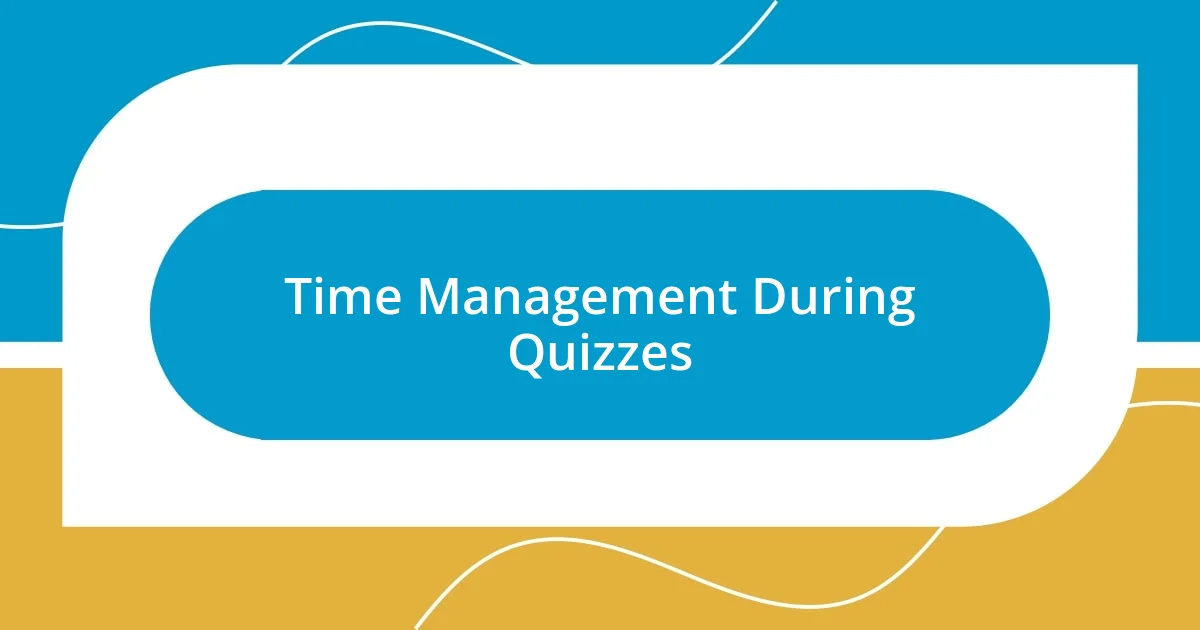
Time Management During Quizzes
Time management during quizzes can be a real game changer. I remember a particularly intense trivia night where we started strong, but as the clock ticked down, the pressure mounted. We realized we were spending too long on each question, which meant we didn’t have enough time to ensure accuracy on later rounds. It’s a classic pitfall that can easily sneak up on even the most prepared teams.
One thing I found helpful is setting internal time limits for each question. For example, we made it a habit to only spend one minute max on general knowledge questions. This way, if we reached that mark without a solid answer, we felt more comfortable making an educated guess and moving on. It kept the momentum alive and allowed us to tackle more questions with confidence. Have you ever felt that sense of urgency when time is slipping away? It can be exhilarating, but it can also lead to rushed decisions if we’re not careful.
Additionally, I’ve learned that it helps to scan the entire quiz sheet to gauge our pace early on. This strategy allows us to identify the easy questions that can be answered quickly, essentially building up “time credits” for the more challenging ones later. I once experienced that magic moment when I glanced ahead and noticed a series of questions we could easily answer—it’s like a wave of relief when you realize you’re ahead of schedule! Balancing speed and accuracy is the key, and finding that rhythm with my teammates has always boosted our overall performance.

Adapting to Different Quiz Formats
Adopting different quiz formats has been a transformative experience for me. I recall a pub quiz that switched gears unexpectedly from traditional multiple-choice questions to a picture round. My team was thrown off at first, but it reminded us to think flexibly. The truth is, being adaptable isn’t just beneficial—it’s essential. How many times have you felt completely at ease with one type of question, only to struggle when the format changes? It’s those moments that test our ability to pivot and stay engaged.
One memorable night, the quizmaster introduced a lightning round where answers needed to be shouted out quickly. Initially, we were hesitant; some of our best knowledge lives in thoughtful reflection. But, as I watched my teammates warm up, a collective energy filled the table. I realized that embracing the chaos of the moment propelled us into a different zone. We ended up surprising ourselves by answering questions we might have overthought in a longer format.
Shifting my mindset towards varying formats has not only made quizzes more enjoyable for me, but it’s also fostered a greater sense of camaraderie among my teammates. I’ve seen how our varied strengths come together beautifully when we embrace diversity in the types of questions. It’s a lot like life, isn’t it? Isn’t it refreshing when you find yourself really connecting with others, as you all navigate challenges together? By adapting to each new quiz format, we not only bolster our chances of winning but also deepen our shared experience.

Evaluating Your Performance After Quizzes
Reflecting on your performance after a quiz can reveal valuable insights. I often take a moment to discuss what worked and what didn’t with my team. For instance, after one particularly brutal round of science questions, we realized that our collective knowledge was lacking. It prompted a fun brainstorming session afterward where we vowed to tackle more science trivia together. Isn’t it incredible how a challenging experience can morph into a motivating factor for improvement?
I like to analyze the questions we struggled with the most. After a recent quiz, I pulled out my phone to check the correct answers and learned some fascinating facts along the way. One question about obscure historical events had stumped us, but diving deeper into it later not only broadened my knowledge but also prepared me for future quizzes. It’s a real bonus to convert setbacks into learning opportunities. Have you ever revisited a quiz just to see how much you learned from it?
Revisiting quiz performance also helps me feel more connected to my team. I remember a night when we breezed through the movie round, but bombed the geography section. Laughing about our silly mistakes and discussing how to improve fosters stronger bonds within the group. I firmly believe that each quiz is not only an opportunity to exhibit knowledge but also a chance to strengthen relationships. How do you reflect on these moments with your own team? It’s the shared laughter and insights that keep me coming back week after week.
